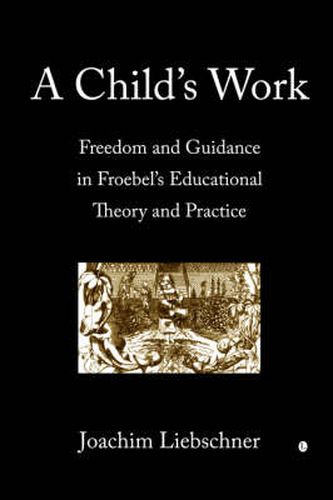Readings Newsletter
Become a Readings Member to make your shopping experience even easier.
Sign in or sign up for free!
You’re not far away from qualifying for FREE standard shipping within Australia
You’ve qualified for FREE standard shipping within Australia
The cart is loading…






This book considers Friedrich Froebel’s work and ideas in the light of the continuing debate over methods of primary education, raising the old conflict between child-centred and traditional education; concern about the role of teacher in the classroom; and the renewed challenge of ‘play’ as a tool of education. To Froebel, play provided the means for a child’s intellectual, social, emotional and physical development. Froebel believed that the education of a child began at birth, and that parents and teachers played a crucial role in helping children in this activity. ‘Play is a mirror of life’ - he wrote, leading to self discipline and respect for law and order. The events of Froebel’s life are carefully documented in A Child’s Work, together with their influence on his ideas and their spread. The author shows how the early death of Froebel’s mother and a home lacking in love were to provide the impetus behind one of Froebel’s overriding aims: the fostering of family life. The shaping of his educational thought and philosophy through contact with the ideas of other educators, especially his ‘spiritual father’ Pestalozzi, and philosophers such as Kant, Hegel and Krause, is examined. Froebel’s continuous reassessment of the function of play in a child’s life came to fruition in the concept of the Kindergarten and the creations with which he peopled it. Illustrations from original sources complement the thorough explanations of these educational innovations in the book. From the soft ball on a spring, the simplest of the Gifts, to the unravelling of more complex ideas in the Mother Songs, Froebel incorporated the various facets that he saw as important in play: the notion of the symbolic and the surmise, the tension between the known and the unknown, the development of physical dexterity and care for the environment. As we continue to shift towards an emphasis on a more formal, more restrictive and less creative mode of education, it is an appropriate time to re-examine Froebel’s contribution to educational thinking, which was revolutionised by his ideas. His respect for a child as an independent, searching and creative person learning through his own actions, and for the teacher as facilitator and guide, led to monumental changes. Froebelis legacy challenges us to examine the assumptions underlying current trends in education, and our attitude towards educating young children.
$9.00 standard shipping within Australia
FREE standard shipping within Australia for orders over $100.00
Express & International shipping calculated at checkout
This book considers Friedrich Froebel’s work and ideas in the light of the continuing debate over methods of primary education, raising the old conflict between child-centred and traditional education; concern about the role of teacher in the classroom; and the renewed challenge of ‘play’ as a tool of education. To Froebel, play provided the means for a child’s intellectual, social, emotional and physical development. Froebel believed that the education of a child began at birth, and that parents and teachers played a crucial role in helping children in this activity. ‘Play is a mirror of life’ - he wrote, leading to self discipline and respect for law and order. The events of Froebel’s life are carefully documented in A Child’s Work, together with their influence on his ideas and their spread. The author shows how the early death of Froebel’s mother and a home lacking in love were to provide the impetus behind one of Froebel’s overriding aims: the fostering of family life. The shaping of his educational thought and philosophy through contact with the ideas of other educators, especially his ‘spiritual father’ Pestalozzi, and philosophers such as Kant, Hegel and Krause, is examined. Froebel’s continuous reassessment of the function of play in a child’s life came to fruition in the concept of the Kindergarten and the creations with which he peopled it. Illustrations from original sources complement the thorough explanations of these educational innovations in the book. From the soft ball on a spring, the simplest of the Gifts, to the unravelling of more complex ideas in the Mother Songs, Froebel incorporated the various facets that he saw as important in play: the notion of the symbolic and the surmise, the tension between the known and the unknown, the development of physical dexterity and care for the environment. As we continue to shift towards an emphasis on a more formal, more restrictive and less creative mode of education, it is an appropriate time to re-examine Froebel’s contribution to educational thinking, which was revolutionised by his ideas. His respect for a child as an independent, searching and creative person learning through his own actions, and for the teacher as facilitator and guide, led to monumental changes. Froebelis legacy challenges us to examine the assumptions underlying current trends in education, and our attitude towards educating young children.